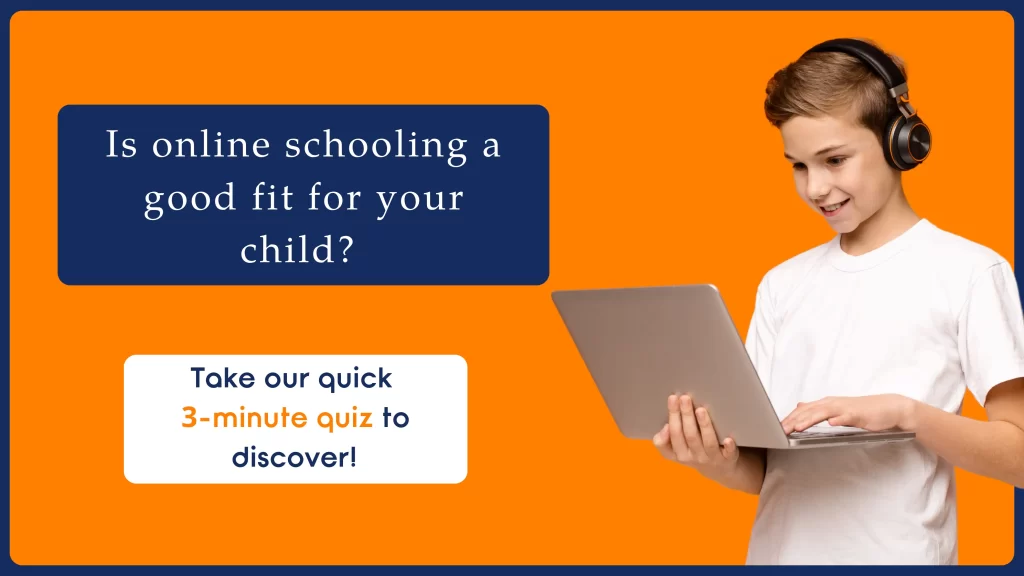Have you ever thought of online schooling for your child? The idea feels appealing, but transitioning from a traditional to an online learning mode seems scary. Is Online School Good for Your Child? What if online education doesn’t provide the same educational quality as traditional schooling? What if it doesn’t suit your child? This post will clear all your doubts about online schooling.
Rapid advancements in technology have transformed various sectors today. In education, it has introduced online learning, an innovative classroom alternative. The trend of online schooling is rising considerably, and more parents are considering this option with each passing day.
This comprehensive guide helps you determine whether you should choose online education for your child. We have discussed the mode of online education, its benefits, and its drawbacks that will give you a clear idea of whether it is the best fit for your child.
Understanding Online Schooling
Online education is a tech-based educating approach for today’s digitally fluent generation that replaces traditional brick-and-mortar classrooms with virtual platforms. It allows students to attend school without leaving home and learn using advanced technologies and programs.
Online schooling makes education engaging and caters to the individual learning styles of different students. Live virtual classrooms, interactive lectures, and discussion forums provide an all-encompassing learning experience. Let’s discuss some of the advantages of online education.
Flexibility in Schedules
The flexibility that online schooling offers is arguably the most important benefit of online education. Unlike the fixed schedules of traditional schools, online education has more of an adaptable schedule that can be adjusted according to the child’s needs.
This flexibility is especially important for kids with other commitments outside of school, like sports, art, entrepreneurship, etc. For instance, a flexible curriculum allows student-athletes to continue their careers without sacrificing academic growth. Otherwise, most of them would have to quit their education.
Personalized Learning
Online learning personalizes education for kids and helps each kid progress at their own pace. Students can hurdle through the topics they are good at and give more time to subjects they have difficulty with.
Accessibility and Convenience
With this new learning mode, education is just a few clicks away. There is no need for daily commutes and other physical and geographical constraints. A stable internet connection is all that is needed to study at any institution around the world.

Who Are Online Schools For?
Online schooling, with its flexibility and accessibility, appeals to a diverse range of students. Let’s discuss some characteristics that successful online students share to better understand its benefits.
Characteristics of Successful Online Students
Self-Directed: The autonomous nature of online schooling requires students to manage their time and commitments effectively. So, those who can plan their daily schedule are more suitable for online schooling.
Technology Proficient: Online learning is technology-based, so online students are proficient in using modern programs and software. Students who are familiar with technology often benefit more from online education.
Motivated: Intrinsic motivation is the key to academic success. Engaging in online lectures and proactively managing the coursework allow students to excel in their studies and stay motivated. Motivated students are more likely to continue online lessons.
Good Communication Skills: As children study online, they learn how to communicate orally and verbally, which is an essential component of online setup.
Is Online School Better than In-person?
Online schooling is a blessing in different scenarios where traditional education fails to meet the needs of children. Some of them are as follows:
Students Involved in Travel-Demanding Extracurriculars: Student-athletes, artists, or musicians who frequently travel cannot attend traditional schools. Online schooling is helpful for such students as it has no location restrictions.
Students in Military Families: Military families have to move frequently, disrupting children’s education. Online schooling is location-independent, and it provides stable education.
High-Performing and Gifted Students: Highly capable and gifted students seek advanced coursework, which traditional schools can’t always provide. Online education lets students decide their personalized coursework and can be beneficial.
Students Who Can’t Attend Schools Due to Health Issues: Students who have health issues like physical disability can’t attend regular schools with convenience. Online schooling provides them a way to continue their education from home.
Is Online School Good for Your Child?
To decide whether online schooling will work for your child or not, consider these factors:
What’s Your Child’s Learning Style?
Identifying your child’s learning style can help you make better decisions for them. Kids usually lean toward one of the following learning modes.
Auditory Learning
Auditory learners understand things they hear. They prefer listening to things being explained rather than reading them. Online learning with audio-based resources and video lectures can benefit these kids.
Visual Learning
Visual learners prefer images, maps, and graphical representations to understand concepts. Online schooling offers visual tools like infographics, educational videos, and interactive modules that can be helpful for these learners.
Kinesthetic Learning
These learners learn best through practical tasks and experiences. Online programs that provide interactive learning are helpful for kinesthetic learners.
Is Your Child a Self-Starter, or Do They Require More Structure?
Find out whether your kid can manage tasks independently and stay on top of deadlines or if they need a proper structure to progress in the right direction. If your child needs a structured environment, they might thrive better in traditional schools.
It’s not that online schools have no structure at all. Teachers and management provide regular support regarding their coursework and homework, etc. However, as there’s no teacher physically there, you have to arrange for the oversight kids need.
Consider Children’s Social Aspect
Traditional schools provide many opportunities for in-person interactions, but online schooling is lacking here. Online education allows interaction through group chats and calls, so make sure that your child is comfortable with them.
Moreover, when you choose online education, arrange physical extracurricular activities for them, too, so that their social life doesn’t get affected.
Final Thoughts
Whether to choose online education for your child should be made by considering factors like your child’s learning style, what type of structure and course content they prefer, and how online education will affect their social life. Traditional schools are more structured and social, while online schools are more flexible.
A few downsides associated are lack of structure and social interaction. This problem can be overcome by providing extra oversight and arranging physical extracurricular activities.







